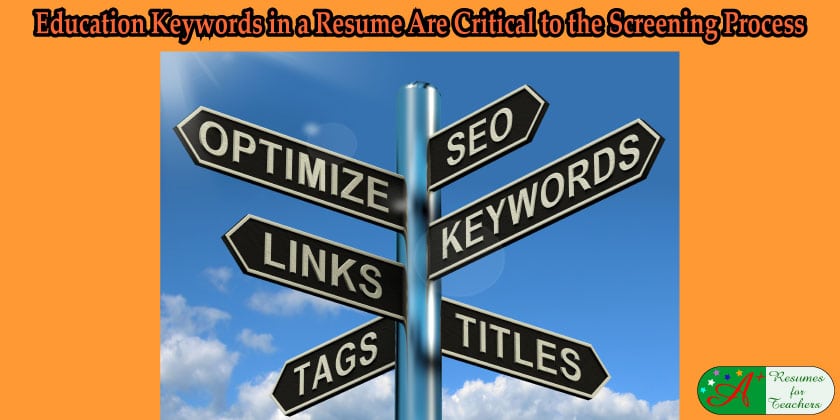In this article, you will discover why education keywords matter throughout the job search document creation and the interview.
Education-specific keywords in a resume are more critical than ever due to schools’ and districts’ increasing reliance on digital screening processes. Applicant Tracking Systems (ATS) are now the standard, with approximately 80% of schools using such tools to filter resumes quickly. These systems search for keywords that reflect the skills, qualifications, and experiences required for a role. If your resume lacks these keywords, it will likely be excluded before it reaches a human reviewer.
This approach streamlines hiring for administrators, who often receive hundreds of applications for a single position. It saves time and effort while ensuring candidates meet the minimum qualifications. However, for job seekers, this means understanding how to incorporate relevant keywords strategically to increase the likelihood of advancing in the hiring process.
How to Identify Relevant Keywords
Job Descriptions Are Key
Job postings are treasure troves of information. They often list the specific skills, qualifications, and characteristics schools value in candidates. Phrases like classroom management, differentiated instruction, or technology integration may frequently appear. These are not just descriptors but often the exact keywords that ATS will search for.
Professional Development and Achievements
Reflect on recent workshops, certifications, or training you’ve completed. Keywords associated with these accomplishments, such as Response to Intervention (RTI), formative assessments, or project-based learning, can position you as a well-qualified and proactive candidate.
Networking and Current Trends
If you’re unsure about the most current buzzwords in education, consider engaging with professional teaching communities or reviewing recent industry literature. Depending on the role and school district, trends like social-emotional learning or equity-driven teaching practices might be relevant.
How to Use Keywords Effectively
Integrating Keywords in Your Resume
Simply listing keywords isn’t enough. They must be seamlessly woven into your accomplishments to demonstrate familiarity and practical application. For instance:
Weak Example: Technology integration.
Strong Example: Successfully integrated Google Classroom and other digital tools to create a blended learning environment that increased student engagement by 30%.
This approach combines a relevant keyword (technology integration) with quantifiable evidence of your impact.
Using Keywords in Your Cover Letter
A well-crafted cover letter provides another opportunity to include keywords naturally.
For example:
“As a dedicated educator with a focus on differentiated instruction and formative assessments, I have consistently tailored lessons to meet the diverse needs of my students while fostering an inclusive learning environment.”
Interview Follow-Up: Addressing Keywords in Thank You Letters
A thank-you letter is a professional courtesy and a chance to reinforce your suitability for the role. Consider referencing keywords that came up during the interview or addressing specific questions or concerns the hiring committee mentioned.
Example Responses in Thank-You Letters:
If Asked About a Skill Gap:
“Thank you for highlighting the importance of incorporating advanced technology in classroom settings. As discussed, I am currently pursuing certification in [specific tool] to better meet these expectations.”
If Unusual Circumstances Were Raised:
“I appreciated the opportunity to discuss my strategies for managing large class sizes during the interview. As I mentioned, my experience with data-driven classroom management and differentiated instruction has been key to maintaining effective learning environments.”
By reiterating your skills in the context of the school’s priorities, you reinforce your fit for the role.
Examples of High-Impact Education Keywords
Below are examples of commonly searched education keywords that can help you stand out in the application process:
Teaching Skills: Curriculum development, standards-based grading, inquiry-based learning, cooperative learning.
Technological Proficiency: Smartboard technology, Learning Management Systems (LMS), virtual classroom tools, Google Workspace.
Student-Centered Focus: Individualized Education Plans (IEPs), differentiated instruction, positive behavior interventions, and supports (PBIS).
Assessment Strategies: Data-driven decision-making, summative assessments, formative assessments.
Tips for Avoiding Keyword Overuse
While keywords are essential, overloading your resume with jargon can be counterproductive. Strike a balance by prioritizing clarity and readability. Every keyword should serve a purpose, showcasing how you align with the school’s needs.
Conclusion
Education keywords are the gateway to advancing in today’s competitive job market. By thoughtfully integrating them into your resume, cover letter, and follow-up communications, you increase your chances of standing out to both automated systems and human reviewers. Investing time to tailor your application with relevant keywords demonstrates your understanding of the profession and your commitment to securing the role.
When used strategically, these tools can help you move beyond the digital filters and into the classroom where you belong.


